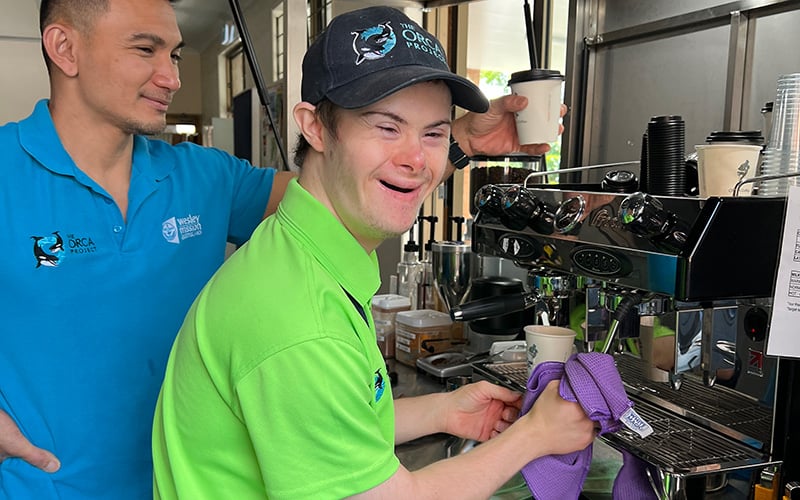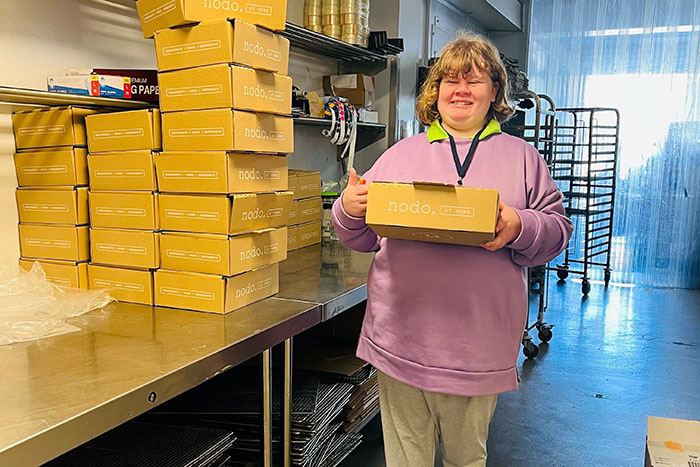Disability Action Week: fostering inclusive workplaces

Image: The ORCA Project participant. The ORCA Project provides work skills training for young adults with a NDIS plan.
Every year, Disability Action Week serves as a powerful reminder of the importance of inclusion, accessibility, and equality for people with disability. It’s a time to reflect on how far we’ve come in terms of accessibility and inclusion, while also acknowledging the road still ahead.
For many, it’s a week to spotlight the barriers, both physical and societal, that still exist for people with disability. From inaccessible infrastructure to discriminatory policies, these barriers prevent full participation in community life. But it’s not just about highlighting issues, it's also about celebrating the accomplishments and talents of people with disability and providing a platform for people to share their voices, stories, and experiences.
This year’s theme, "Accessible communication: connect, include and empower" encourages us to think beyond traditional concepts of accessibility. While much attention is given to physical spaces and digital accessibility, there’s another crucial area we must focus on, the workplace.
People with disability deserve work environments that not only meet their physical needs but also embrace their individual strengths, talents, and potential. It’s time to challenge ourselves and reimagine what an inclusive workplace looks like. How can we create environments where every employee, regardless of ability, can thrive?

Image: The ORCA Project participant.
Fostering an inclusive workplace culture
A truly inclusive workplace goes beyond simply making physical accommodations, though that’s important too. It’s about cultivating a culture where everyone feels valued and able to contribute. Even something as simple as encouraging staff to think inclusively when planning events or initiatives to ensure all activities are accessible and open to all employees can make everyone feels seen, respected and part of the team.
Right worker, right tasks
A key element of an inclusive workplace is recognising the strengths of each employee and aligning tasks accordingly. The "right worker, right tasks" approach is essential when hiring or placing individuals in roles. Instead of forcing an employee with a disability into a job that doesn’t fit their skills or strengths, take the time to understand their capabilities. Focus on what the person can do well and find ways to build on those strengths. Instead of rigidly sticking to job descriptions, consider creating the job position around the person’s skills and abilities. When tasks align with a person’s strengths, they are more likely to succeed, feel fulfilled, and contribute meaningfully to the organisation.
Offering support in the workplace
Support in the workplace should be tailored to the individual, just as it should for all workers. Don’t overcomplicate support, simply ask yourself how you would support any other employee who may need help. Sometimes, it’s about providing additional training or adjusting workloads to accommodate an individual’s needs. But it’s not about making assumptions; it’s about being proactively engaging and ensuring workers have what they need to do their best work.
Best ways to learn or train
Everyone has a unique way of learning, and this is especially true in the workplace. When you’re introducing new tasks or procedures, ask employees how they prefer to learn. Some may prefer visual aids, like charts or instructional videos, while others may prefer written instructions or step-by-step walkthroughs. Rather than assuming everyone learns in the same way, take the time to listen and understand the individual’s preferred learning style. By offering flexibility and customising training methods, you make the workplace more inclusive for all types of learners, ensuring that everyone has the best chance to succeed.
Breaking down tasks into manageable steps
For employees who might find certain tasks overwhelming, breaking the task down into smaller, more manageable steps can be highly effective. This approach is especially helpful for those who have cognitive or sensory disabilities, as it allows them to focus on one part of the task at a time without feeling overwhelmed. Start by recognising the parts of the task that the person can already do and build from there. Provide guidance and support on the areas that still require development but celebrate the parts they can accomplish independently. By focusing on incremental progress, you help workers build confidence and competence, which ultimately leads to greater independence and job satisfaction.
Encouraging independence and excellence
One of the best ways to support employees with disability is by fostering independence. At first, this may require more assistance, but as the person grows more confident and skilled in their role, gradually reduce the support you provide. This process helps the employee become more self-sufficient and able to manage their tasks independently. It’s also essential to put strategies in place for self-checking. This enables them to maintain high standards of performance and ensures that they know when they’ve done a great job. Encouraging independence doesn't just benefit the employee, it fosters a culture of excellence throughout the team.
Creating a sensory-friendly and accessible work environment
The physical workspace is a critical element of inclusion. But accessibility goes beyond ramps and wide doorways; it also includes factors like lighting, noise levels, and overall sensory stimulation. By experimenting with the work environment, you can find ways to ensure that it’s both accessible and conducive to productivity for everyone. A sensory-friendly space makes a significant difference in ensuring everyone is comfortable and able to perform their best.
Taking action beyond the week
Disability Action Week isn’t just about raising awareness; it’s a call to action. By thinking critically about how we structure our workplaces and support employees, we can foster environments that are not only inclusive but also empowering.
True change requires ongoing commitment and advocacy. Things like advocating for accessibility in your community, supporting disability-owned businesses, engaging with disability advocacy organisations and pushing for systemic change are all ways to be an active participant in making a lasting impact.
Accessible communication is about connecting, including, and empowering, creating workplaces that meet the diverse needs of all employees and ensuring everyone has the opportunity to succeed.
Work with a single provider
Wesley Mission Queensland is a registered NDIS provider and has been providing disability services in the community for more than 20 years. Work with a single trusted provider to achieve your goals, no matter how varied and diverse they are.
